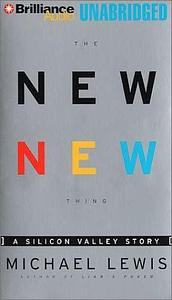Take a photo of a barcode or cover
3.5* - good, but not nearly as good as Flash Boys and The Big Short. Interesting stuff.
Este libro ha envejecido, no demasiado pero da la sensación al leerlo de estar leyendo un libro de historia, todo lo contrario que con El póker del mentiroso, que sigue hoy tan vigente como entonces.
Me encanta el olfato que tiene ML para elegir los temas sobre los que escribe. elija lo que elija, hasta ahora, siempre me ha parecido el tema más interesante del mundo.
En esta ocasión asistimos a la creación, ascenso y pinchazo de la burbuja de las puntocom desde primera fila, siguiendo la historia de Jim Clark, un emprendedor en toda regla que se forró secuencialmente con Sillicon Graphics, Netscape y Healtheon. Clark es un individuo curioso, con una ansia interminable por hacer cosas nuevas, que triunfó varias veces debido principalmente a la gran capacidad de convicción que tenía sobre inversores y colaboradores. Un personaje curioso. ML dedica un montón de páginas al Hyperion, el yate de Clark, que funciona en automático guiado por 25 ordenadores. La obsesión de Clark por su yate contribuye a que lo veamos como un bicho raro, efecto totalmente buscado por el autor.
En resumen, el libro es bueno, está muy bien escrito, y el tema es interesante. Recomendable.
Me encanta el olfato que tiene ML para elegir los temas sobre los que escribe. elija lo que elija, hasta ahora, siempre me ha parecido el tema más interesante del mundo.
En esta ocasión asistimos a la creación, ascenso y pinchazo de la burbuja de las puntocom desde primera fila, siguiendo la historia de Jim Clark, un emprendedor en toda regla que se forró secuencialmente con Sillicon Graphics, Netscape y Healtheon. Clark es un individuo curioso, con una ansia interminable por hacer cosas nuevas, que triunfó varias veces debido principalmente a la gran capacidad de convicción que tenía sobre inversores y colaboradores. Un personaje curioso. ML dedica un montón de páginas al Hyperion, el yate de Clark, que funciona en automático guiado por 25 ordenadores. La obsesión de Clark por su yate contribuye a que lo veamos como un bicho raro, efecto totalmente buscado por el autor.
En resumen, el libro es bueno, está muy bien escrito, y el tema es interesante. Recomendable.
a really good book. sobering what a ponzi scheme IPOs have become
Same review as last one: solid, enjoyable interesting profile of Jim Clark just before the dotcom bust of 2000.
"He was the guy who always won the game of chicken because his opponents suspected he might actually enjoy a head-on collision"
Does a particularly good job covering the programming side despite not being a programmer.
The chapter when the boat finally sets sail is a highlight.
"“The MSB is in units of 10,” said Steve. God knows what it meant, but that’s what he said"
"Clark just stared at the screen as his yacht crept across the Saudi Arabian desert. “Fuck it” was all he said"
"With that he stumbled over to one of the computer screens on deck—the one Allan sat in front of but ignored—and stuck a yellow Post-it sticker on its surface. It read, “Allan: I fucked up the longitude program. We are not in the Arabian desert. Steve.”"
"“There are a million lines of code in there,” said Robert, motioning to the twenty-five computers, “and nowhere in them will you find the word ‘boat.’”"
"He was the guy who always won the game of chicken because his opponents suspected he might actually enjoy a head-on collision"
Does a particularly good job covering the programming side despite not being a programmer.
The chapter when the boat finally sets sail is a highlight.
"“The MSB is in units of 10,” said Steve. God knows what it meant, but that’s what he said"
"Clark just stared at the screen as his yacht crept across the Saudi Arabian desert. “Fuck it” was all he said"
"With that he stumbled over to one of the computer screens on deck—the one Allan sat in front of but ignored—and stuck a yellow Post-it sticker on its surface. It read, “Allan: I fucked up the longitude program. We are not in the Arabian desert. Steve.”"
"“There are a million lines of code in there,” said Robert, motioning to the twenty-five computers, “and nowhere in them will you find the word ‘boat.’”"
“Never was a man’s love of risk so beautifully amplified by his environment as Clark’s was in Silicon Valley.”
― Michael Lewis, The New New Thing: A Silicon Valley Story

I did like Lewis' exploration of the relationship of Investment banking and the information technology companies that seemed to weed up in Silicon Valley during the late 90s. The normal venture technology relationship seemed to invert in Silicon Valley. Power shifted from the money men to the idea men, or perhaps not even the idea men, but the risk men, the development men. It was, and still is, a bit of an aberration in business space and time. This book focuses on Jim Clark, who ended up wet-nursing three different IT start-ups (Silicon Graphics, Netscape, and Healtheon).
Like his fellow Princeton New New Journalism master, John McPhee, Michael Lewis does a phenomenal job of finding and fleshing out the exact right person to serve as the locus for an even bigger story. This book is nominally focused on Jim Clark, but really is about the technology bubble of the late 1990s. Jim Clark just happens to be a near perfect example of the best and worst of that particular place and time in America's economy.
Not my favorite Lewis. Not because it isn't well written, but mainly subject matter. I'm more of a value man (Graham & Dodd), not a kamikaze investor. The whole idea of the New New thing is both interesting and a bit repellant to me. I love disruptive businesses, but I'm just not a fan of the smoke and mirrors of the early parts of these businesses.
― Michael Lewis, The New New Thing: A Silicon Valley Story

I did like Lewis' exploration of the relationship of Investment banking and the information technology companies that seemed to weed up in Silicon Valley during the late 90s. The normal venture technology relationship seemed to invert in Silicon Valley. Power shifted from the money men to the idea men, or perhaps not even the idea men, but the risk men, the development men. It was, and still is, a bit of an aberration in business space and time. This book focuses on Jim Clark, who ended up wet-nursing three different IT start-ups (Silicon Graphics, Netscape, and Healtheon).
Like his fellow Princeton New New Journalism master, John McPhee, Michael Lewis does a phenomenal job of finding and fleshing out the exact right person to serve as the locus for an even bigger story. This book is nominally focused on Jim Clark, but really is about the technology bubble of the late 1990s. Jim Clark just happens to be a near perfect example of the best and worst of that particular place and time in America's economy.
Not my favorite Lewis. Not because it isn't well written, but mainly subject matter. I'm more of a value man (Graham & Dodd), not a kamikaze investor. The whole idea of the New New thing is both interesting and a bit repellant to me. I love disruptive businesses, but I'm just not a fan of the smoke and mirrors of the early parts of these businesses.

